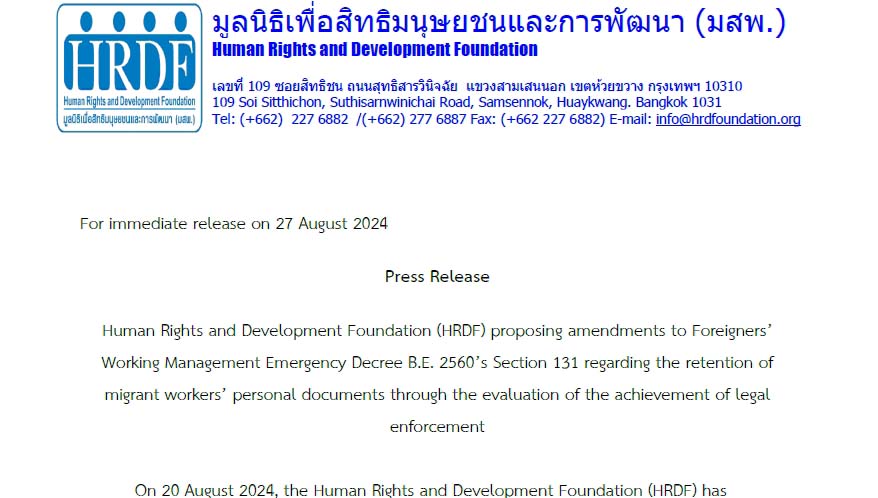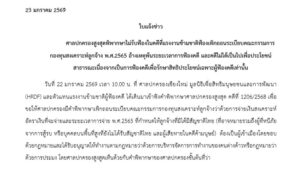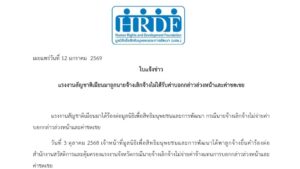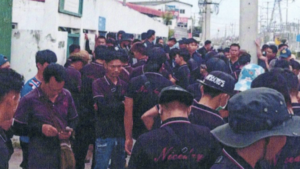For immediate release on 27 August 2024
Human Rights and Development Foundation (HRDF) proposing amendments to Foreigners’ Working Management Emergency Decree B.E. 2560’s Section 131 regarding the retention of migrant workers’ personal documents through the evaluation of the achievement of legal enforcement
On 20 August 2024, the Human Rights and Development Foundation (HRDF) has proposed recommendations and opinions to the Ministry of Labour regarding the retention of the migrant workers’ personal documents pursuant to Section 131 following a public consultation on the evaluation of the achievement of enforcement of the Foreigners’ Working Management Emergency Decree B.E. 2560 and its amendments no. 2 B.E. 2561.
The recommendations have been developed based on the outcome of the workshop jointly held by the Department of Employment (DoE)’s Central Employment Registration and Workers Protection Division and the Migrant Workers Assistance Centers on “The development of guidelines regarding the retention of migrant workers’ personal documents” held during 27-28 June 2023 in Bangkok. Base on the analysis of challenges and conclusions reached during the workshop, the policy and legal recommendations have been developed as a result of the sharing among participants from government agencies and civil society organizations. This includes guidelines for the authorities in response to the retention of migrant workers’ personal documents. HRDF has thus prepared a summary and recommendations for the evaluation of the achievement of enforcement of the Emergency Decree to ensure its compliance with general principles and guidelines concerning fair recruitment and recruitment fees as well as other related expenses determined by the International Labour Organization (ILO) and for the promotion of safe migration and the prevention of human trafficking and forced labour with detail as follows;
Firstly, the Ministry of Labour should repeal legal provision which allows either an employer or a broker to retain the migrant workers’ essential personal documents as prescribed in Section 131 paragraph two of the Foreigners’ Working Management Emergency Decree B.E. 2560 (amended in 2019) that;
“Section 131. Any person who withholds a work permit or an essential personal document of a foreigner shall be liable to imprisonment for a term not exceeding six months or to a fine from ten thousand to one hundred thousand baht or to both.
If the foreigner is willing to have their work permit or personal document withheld by another person, the person shall facilitate the foreigner’s access to the documents at all times as requested by them. Any violation shall be liable to the punishment similar to the offence in paragraph one.”
Based on the following reasons;
- In reality, in terms of the power relationships, an employer or a broker retains power over a migrant worker due to their being foreigner, or having no relatives in Thailand, or having limited knowledge or education, or facing language and communication barriers. Paragraph two of Section 131 therefore gives a loophole which can be exploited by an employer who wants to retain the employee’s essential documents to serve their mischievous purposes, i.e., to create strings attached, or to impose control, or to coerce the employee, etc. As a result, it is difficult for the employee to refuse or resist such move and has to allow their employer to get hold of their essential documents as a bondage despite not on their own volition. Such provision in paragraph two gives an employer an excuse or to claim the employee is “willing”, or “allow” them to “keep” such essential documents. It is extremely challenging to establish if the employer simply “keeps” the documents or withholds them with or without “consent” from the employee.
- Labour protection laws including the Foreigners’ Working Management Emergency Decree B.E. 2560 is not only a public law to ensure an offender be held criminally liable, but is also a social law which aims to protect labourers including workers, jobseekers, and employees. All these labourers retain a vulnerable position in terms of their power relationships between the employer and the employee and tends to attain a status and economic and social power inferior to the employer. Therefore, the language of the law, its enforcement and its interpretation must comply with the intention to essential protect the workers. The legal language of paragraph two is rather vague which may give rise to the interpretation that tends to violate labour rights, rather than to protect the workers.
Based on the reality in various cases, the employer who withholds essential personal documents of their employee who is migrant workers often claims they have received consent from the worker, or the worker simply asks them to keep the documents. But when the worker asks for the documents, they often encounter a plethora of problems and obstacles including a demand that the worker has to first pay them fees for applying for the documents, being subject to questioning, or retention. As a result, the migrant employee has to concede to continuing living under such exploitative condition and is vulnerable to become a victim of forced labour or trafficking in person. - By allowing the employer to get hold of the documents, it may violate the laws and regulations of law enforcement agencies which require that the migrant workers have to carry their personal documents with them at all times. If the migrant workers are found to not have such documents, they could be considered committing an offence since they are required to produce the documents at the officials’ request. If such paragraph is not repealed, it may give rise to legal incompatibility and render the workers a victim in the justice process being vulnerable to arrests. Therefore, such personal documents must be in the possession of migrant workers at all times.
- As to some arguments that if paragraph two is repealed, it may give rise to practical problems such as the requirement to report to the authorities every 90 days which requires the migrant workers to surrender their documents to the employer’s Human Resource Department for such processing. There is a misunderstanding that by repealing paragraph two, such documents shall not be handed over to the HR for such processing and it might incur the workers even more burden. In such cases, by having the workers handing their ID cards or personal documents to serve their personal interest, it shall not render either the employer or other person an offender pursuant to Section 131, paragraph one.
- Section 131’s paragraph two gives a loophole for a confused official to determine at their discretion that the employer who “keeps” the migrant worker’s essential personal documents simply keeps them at the consent or willingness of the employee pursuant to paragraph two of Section 131, or “withhold” such documents pursuant to paragraph one. In some cases, an employer may withhold the employee’s documents as element of crime regarding the offence of forced labour and/or trafficking in person. Section 131’s paragraph two therefore allows some officials to make a travesty of truth and justice if they tend to have close relationships with or tend to favor the employer, or may want to commit a corrupt practice to serve the employer’s interest. This shall render the enforcement of the Anti-Trafficking in Persons Act ineffective.
Secondly, setting out practice to advocate for the renewal of work permits and the right of residence or the right to work for migrant workers who have been victimized beyond the crime of trafficking in person and forced labour. Their criminality has been rendered as a result of the practice of either an employer or a broker through the retention of their documents, or whatsoever reasons. In such cases, competent officials should be authorized to reregister their work permit by invoking exiting laws or regulations.
On this issue, it is therefore recommended for the Ministry of Labour to propose to the government on behalf of the Policy Committee to ensure such victims be afforded with the right to stay and to work. Such victims can invoke a record of their reporting the case to the police or other relevant documents to apply for such status. Consideration should also be given to their status of being a victim of document retention and labour violation. If such workers can afford a legal status, they shall be able to renew their documents pursuant to the state policies and to land a new job through the invocation of Section 17 of the Immigration Act B.E. 2522 coupled with Section 63 paragraph two of the Foreigners’ Working Management Emergency Decree B.E. 2560.
Thirdly, no mediation procedure should be initiated since the employer’s commission of the offence has been completed. In other word, if an employer has already completed the elements of crime regarding document retention without the worker’s consent, or the worker cannot retrieve the documents when they want to, this shall be considered that the employer has committed the crime. This includes cases of workers who notify, complain, or contact either the DoE’s officials or the police to ask for help to retrieve their documents from their employer since by complaining with the authorities, it indicates that the workers do not have access to their documents. In such cases, the authorities should consider all the elements of crime have been completed. And if the authorities fail to help the offender liable according to the law, it should be considered an omission of duties pursuant to the Penale Code’s Section 157. Therefore, competent officials should not initiate a mediation to settle the case which may render the enforcement of Section 131 paragraph one ineffective.
Fourthly, in terms of its collaboration with concerned authorities, it is incumbent on the Ministry of Labour to make the process transparent including their collaboration with the Office of Labour Protection and Welfare, the Port-in Port-out (PIPO) Control Centers, and other grievance mechanisms and referral services. For example, when the Office of Labour Protection and Welfare may need to coordinate and refer the cases to other relevant agencies if such cases do not fall within their jurisdiction. Such referrals have to be confined to a clear timeframe and procedure. This includes an effort to ensure the Employment Office facilitate the Migrant Workers Assistance Centers (MWAC) to handle the complaints.
Fifthly, theDepartment of Employment (DoE) should adopt a preventive and proactive approach through an effort to publicize information and to educate, or to create new platforms accessible by the employers and the workers. This may include the digitalization of documents, a campaign to have banners posted in workplaces explaining the office and punishment regarding document retention, an effort to raise the awareness through meetings or the creation of safe space for employers, employees and authorities to exchange information.
Sixthly, the Ministry of Labour should develop its existing tools including the interrogation template RB1, the filtering/screening template, etc. and to ensure their coherence and clarity. This can help to facilitate the harmonious collaboration between the lawmakers and policymakers in Bangkok and local authorities. Meetings should be held to set out direction of such collaboration, and to evaluate risks and social protection.
For more information, please contact:
Ms. Phenpiccha Jankomol,
Project Coordinator of Anti-Labour Trafficking Project
ph************@***il.com




